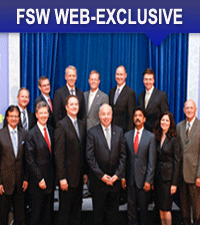The event, which also honoured the Top 100 and Top 50 sales performers in the foodservice and hospitality business, respectively, began with a networking breakfast complete with good croissants, fruit and conversation, followed by an awards ceremony heralding seven companies. TDL Group Corp. (Tim Hortons) earned the top spot in the Top 100, as listed in Foodservice and Hospitality magazine, and the award for Greatest Dollar Increase over last year. Tim’s was followed by Tortoise Restaurant Group Inc., which eked out the Greatest Percentage Increase, and Compass Group Canada, recipients of the Green Leadership Award. Sister magazine, Hotelier, presented Four Seasons Hotels and Resorts an award for gaining the number 1 spot on its Top 50 list, while Atlific Hotels also earned a nod for Greatest Dollar Increase. Monte Carlo Inns was lauded for the Greatest Percentage Increase, while Minto Suite Hotel earned the Green Leadership award in the lodging category.
The morning’s events culminated in the H20 Summit, which united an impressive roster of industry heavyweights — including Jacques Mignault, COO of McDonald’s Restaurants of Canada Limited; Roland Walton, COO, Canada of the TDL Group Corp.; David Minnett, president of Swiss Chalet and Harvey’s Restaurants; Brian Richardson, VP of Brand Marketing & Communications for Fairmont Hotels & Resorts and Philippe Gadbois, senior VP, Sales & Marketing Atlific Hotels. The unique gathering saw many of the hospitality’s most respected leaders talking candidly about everything from the recession to healthy food trends and social media.
Government intervention, in particular, struck a chord with the panellists. “The issue of government intrusiveness is growing at the municipal level,” said Walton of the TDL Group. “Lots of plans from municipalities could be detrimental to our development,” he added, in reference to legislation surrounding paper cups and drive-thrus.
“The real threat to the industry is the patchwork of legislation,” pointed out Ian MacKay, VP and GM of Aramark Healthcare, alluding to New York City’s massive drive to reduce sodium, with varying jurisdiction regulations, creating havoc for multi-unit foodservice companies aiming to create a standard.
The group was united on their feeling about the power of social media, and their thoughts were echoed in the crowd of some 150 operators and suppliers, who used electronic touch pads to voice their opinion. Forty-six per cent saw Facebook as the most important social medium, followed by Twitter at 28 per cent. Most panellists agreed such sites are here to stay and great industry tools. “Brands are all about trust and you can’t get a more direct way of building that trust,” pointed out Colin Moore, Starbucks Coffee president, Americas.
Starwood Hotels & Resorts’ Stephen Foster agreed. “It’s been an amazing transformation. Who would have thought five years ago that words like Facebook and Twitter would be common words in our vocabulary,” he started. “It’s transitioned the way we reach our customers. Our marketing used to be a one-way dialogue, and now it’s multi-way. We used to tell people how wonderful our properties were, and now, we have to hope that our customers tell each other how great they are.”
On the flip side, Steven Tsambalieros, COO of Second Cup, cautioned about the potential pitfalls of such a powerful medium. “Any time someone has a hiccup everyone in the world knows about it,” he warned “The sensationalizing that’s occurring can be really detrimental, so we need to manage that.”
The Vancouver Olympics provided some reason for optimism moving forward, but even those with hotel properties that benefited from days of sold-out rooms, were careful not to overstate the gains. “The Games undoubtedly provided a wonderful platform to showcase our properties in that part of Canada,” said Fairmont Hotels & Resort’s VP of brand marketing and communications, Brian Richardson. “But to a certain degree, from a brand perspective, some of it was a re-distribution, in that some guests who may have stayed in Banff or Jasper, chose to stay in Vancouver instead.” Richardson also said he’s skeptical about the long-term benefits. “I want to believe that there will be positive residual effects, but if you look at the Salt Lake and Turin examples, it’s hard to show. At this point, we’re unlikely to advise any of our hotels to build anything into their 2011 budgets, reflecting positive residual benefits from the games.”
On the whole, it’s clear 2009 wasn’t a banner year, but one thing that rang true at the discussion was the admission of the positive effect of the recession — yes, there was one. “We’ve become better managers of our money,” explained Ron Baugh, senior VP of Wendy’s Restaurants of Canada Inc.
So, although it’s a long climb back to the halcyon days of 2007, many are bullish about the future. “It’s a job requirement to be optimistic at Boston Pizza,” joked Ken Otto, executive VP at the pizza chain, alluding to the attitude of his famous boss, Jim Treliving of the CBC’s entrepreneurial series Dragons’ Den.
For more information on the panel discussion, Top 100 and Top 50 lists, stay tuned for the upcoming issues of Foodservice and Hospitality and Hotelier, respectively, and foodserviceandhospitality.com.
Photo by Lynne Fox


















